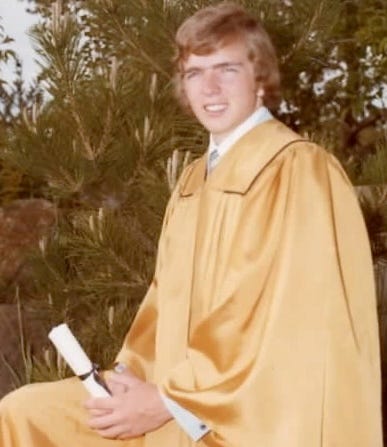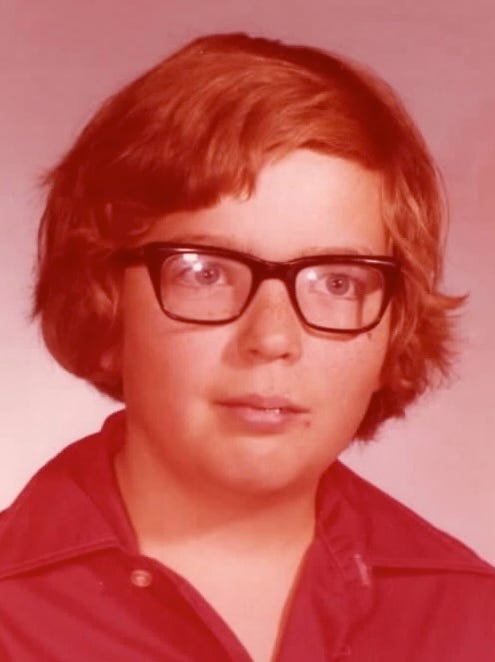Five simple steps to becoming an influencer
Selfies and TikTok abilities not required
We live in a world of 24-year-old, self-educated life coaches and companies that hire big consulting firms so newly-educated MBAs with no industry experience can tell them how to improve their business by reducing the number of employees.
In 2018, a jury of my peers, including the Chief Security Officer of Microsoft, selected me as the most influential security executive in the world. I was shocked and humbled. I always thought influencers needed to know how to take selfies!
Looking back and dissecting my life, I think I’ve found the keys to the path that brought me these accolades.
Step 1 - Don’t do art projects in grade school
In Grade 3 or 4, when I was 9 years old, Miss R., a stereotypical spinster schoolteacher strictly led our class. (To be honest, I know nothing about her personal life, perhaps she was happily married with a gaggle of smiling children and grandchildren, but just liked to be called Miss.)
If your feet were in the aisle between the desks, she would stomp on them to remind you they should be firmly flat on the floor under the desk. If, instead of doing math problems on the blackboard, you chose to discuss the science of lunar landings with your nerdy classmate, you received a free trip to the principal’s office for distracting the smart kid and disturbing the class.
When it was time for art class we all had to make marionettes. Needless to say, art class was not something I excelled at. To this day, I struggle to draw a simple stickman. As the year dragged on, the teacher continually pestered me because I hadn’t handed in my marionette. In the beginning, I said was working on it. For a while, I told her it was almost finished. Then I said I’d left it at home. Then my dog damaged it so I needed to repair it. This went on for months while the rest of the class moved on to building bridges out of popsicle sticks or something. Finally, on a day she seemed somewhat confused, I asked her if she didn’t remember that I’d handed it in “months ago”. She didn’t (because I hadn’t), but I described it in such descriptive detail that she started to remember something that hadn’t happened. In the end, she even remembered the very average grade she’d given me for a marionette that was never made and entered it into the gradebook.
Step 2 - Don’t do homework
By grade 11, I’d learned that I could squeak by with a minimum of effort at school. My mother often complained that if I applied myself, I could get some A’s. She even named every one of my friends who had one or more A’s on their report cards. I told her it was because their parents paid them for every A they got. She promised to pay me $5 per A. My next report card had one A. It was in a subject called Lifetime Sports, probably the easiest subject ever designed for high school. When my mother asked why I only received one A, I said I knew we weren’t a wealthy household and didn’t want to strain the family finances.
In that penultimate high school year, my English teacher Mr. O. knew he had a struggle on his hands. He was a young, new teacher and we were a class of misfits. He was a brilliant teacher. Instead of trying to get us to stutter and stammer our way through Shakespeare, he had us watch Roman Polanski’s R-rated violent version of Macbeth. (Yes, some parents complained.) Instead of having us read boring poetry, he brought his guitar to class, sang Don Maclean’s “Starry Nights” and had us analyze the lyrics.

In short, Mr. O was the best teacher in the world.
Every Monday, Mr. O gave us an essay topic. Essays were due on Friday. Friday morning, I would pedal extra hard, arrive at school a few minutes early, run to the library, and swiftly scribble some words on a piece of paper.
Mr. O wasn’t stupid. One Friday, he asked me to stay after class. He told me I was a good storyteller.
“If you applied yourself, you might even become a good writer.”
Mr. O. then told me, I needed to hand in a work in progress for my essays every day during the week. He would provide guidance so the essay would be better when it was handed in for grading on Friday. We did that for two weeks before he called on me to stay after class again.
“It’s OK.”, he said, “your hastily written essays as as good or better than the ones you work on during the week.”
I immediately reverted to the cycle, sweat, scribble routine that had served me so well.
Step 3 - Don’t travel, move!
Less than a week after I graduated high school, I arrived in Norway to begin a gap year that ultimately lasted four decades.

Our family had briefly been in Norway five years before on a European vacation. Norway was the land of my paternal ancestors and all I knew was that it was a fairytale land where people were polite, hardworking, and loved their Canadian relatives.
My mother didn’t think I was mature enough to survive three weeks away from home let alone a full year. She was completely correct of course.
Within a month, I was so homesick my nightly sleep was disturbed by nightmares of Mom meeting me at the airport and gleefully proclaiming that she’d told me so.
As I struggled with my homesickness, I discovered that I had a Norwegian trait no one had told me about before. I was a stubborn son of a gun. There was no way I would ever give my mother the satisfaction of knowing she was right.
I was so stubborn that I extended my stay. Instead of going home after a year, I remained in Norway for two decades and in Europe for a further two decades after that.
Countries are different when you live there than they appear to be when you simply visit as a transient traveller. Working as a digital nomad in Bali doesn’t mean you know anything about what it’s like to live like a local, but living on what the Norwegian tax authorities say is less than half of the minimum existence level does show you what life is really like in Norway.
Step four - Only do jobs you aren’t qualified for
I left the Norwegian University of Science and Technology with a varied portfolio of exam results but without a degree. My mentor wouldn’t accept my master’s thesis because it said that people who study hard get good grades. I think I subconsciously chose the topic to scientifically prove you didn’t have to waste time studying to get good grades. The numbers showed that the ONLY significant contributor to improved grades was time; the more time you spend time hitting the books, the better grades you’ll get. (Sorry kids, I tried) My mentor said the conclusion was too commonsensical. He wanted me to collect data for four more years to see if we could find “something else”.
I asked him if he thought I was crazy. Then, I walked out.
I began to think about a career in travel. If Miss R. had asked us to draw something about airports back in grade three, I would have drawn one of the little trucks that pulled the luggage carts around the tarmac. It was the only thing I could draw.

I envisioned myself driving one and started applying for jobs at airports and airlines. Airports and travel have always fascinated me. All these people from all these places coming and going and crisscrossing the world. Who are they and why are they travelling?
I applied for job after job and never got an interview. In the end, I was so desperate that I applied for a job as a security guard in a five-star hotel. I knew nothing about security or five-star hotels.
Almost to my surprise, I was called into an interview. The Security Manager was just like the ones you see in the old movies from the 80s. (This was the 80s). An ex.cop with a bushy moustache and a cigarette hanging out of the corner of his mouth. A brilliant investigator with his own sense of morals.
“You’re too old and too educated for this job…. and you have too many opinions.”
He was also a blunt man.
Two weeks later he called me.
“I don’t want to hire you but we only got two applications. The other person doesn’t want the job.”
That was the first of many jobs I was given that I knew nothing about. From managing loyalty and reward programmes to outsourcing travel agent commission payments to running database marketing programmes and doing all three while heading up our corporate safety and security programme, I was a busy man.
So busy in fact that a boss gave me the best advice ever when he found me in my office at nine pm on a Sunday night:
“Go home, go out, go somewhere, but GET A LIFE!”
When you are in a corporate environment and perceived to be good at everything they throw at you, they keep throwing stuff and you keep saying yes because you think it’s good for your career. It’s not.
If you really want to know what’s good for your career, you need to take the next step.
Step five - Marry a Dane
While I was in Norway, I married a nice Norwegian girl. Everyone told us we were perfect for each other.
After she lost her job as a highly paid consultant at a shopping centre development company, I worked double shifts so she could return home and complete her post-graduate degree. Along the way, I was brought into a group that was working on one of the most secret plans in Norway since WWII - we were planning the King’s funeral while the King was still healthy and maintaining an almost god-like status amongst his adoring citizens.
It’s an understatement of British proportions to say it was a secret.
“You can’t tell anyone, not even your wife!”
The planning group, led by a British ex-military planner in a beige Macintosh, didn’t want me in the group because neither Canada (“he left when he was 18”) nor Norway (“he went to a university full of communists and anarchists”) wanted to give me security clearance. Like the security guard job, there was no one else they could ask. They were stuck with me. Two years of clandestine meetings, cover stories, and logistics plans that weren’t even shared with Norwegian police until the King coughed in May 1990.
The King died on January 16, 1991, the night Allied forces attacked Iraq in the quest to liberate Kuwait from the occupation that had started five months earlier. I woke my then-wife and said I had to go to work. I asked her to bring a few sets of clothes to the hotel the next day.
“By the way, King Olav is dead. I guess I can tell you now that I’ve been working on the funeral plans for the past couple of years.”
When I returned home ten days later, I put my feet up and switched the TV on.
“I don’t want to be married to you anymore.”, she said.
We had the perfect marriage and then we had the perfect divorce.
I spent the next eight years in celibacy. My colleagues called me “The Untouchable”.
Life was work and travel and going to the bar after work every night even after putting in a fifteen-hour day while falling further behind in the four jobs I was responsible for.
A series of fortunate events brought me to Denmark. Within a period lasting less than a year, my boss told me to get a life, I quit my job, a friend hired me as a consultant doing another job I wasn’t qualified for (reservations manager), and then the company I’d left called me and said: “would you be willing to move to Denmark”?
The first year in Denmark was a challenge. For a couple of months, I couldn’t get paid because I didn’t have a bank account. I couldn’t get a bank account because I needed to provide three paycheques as proof of income. (Catch 22, 2.0) When I did get paid, my net salary was 1/3 less than what I’d envisioned. The person who hired me, a Norwegian, was on an expat contract. When I asked him about tax, he said as an expat he paid 25%. As a Canadian, I thought I would be an expat too. Fat chance. My salary was one-third of what you needed to qualify…
“Sometimes you need to learn the hard way.”, the person who hired me said.
Just like the first security manager that hired me, the hotels in Denmark didn’t really want me. My job was combined, fifty percent security manager for Copenhagen, and fifty percent corporate head of safety and security.
A sketch at the staff Christmas party two months after I arrived in the country, portrayed me as a long-haired, bearded crazy person who stuck his nose in everywhere babbling away in a language no one understood. A huge question mark was held above his head every time he opened his mouth to great enjoyment from everyone in attendance. I thought it was a weird way to welcome a new staff member.
I started online dating. In those days, it wasn’t the most popular thing in the world. I had one memorable coffee date with a lovely girl. It was so nice that I wrote her a poem afterwards called “She served me candlelight and coffee”.
She broke things off pretty quickly and told me she’d met Mr. Right.
I wasn’t having much luck so I changed my profile name to “Who dares wins”. That nice girl who broke up with me sent me a note. I informed her she had already broken up with me once and I wasn’t going to take that chance again.
We’ve now been married for over 20 years.

After we got married, something else happened. For the first time ever, I was invited to attend staff events at headquarters in Brussels. I was in Brussels for meetings quite often, but never received invitations to social events and I was surprised to learn that other remote-based corporate personnel were.
My corporate position became a full-time one, something I’d lobbied for to no avail for years.
I was invited to our annual business conferences for the first time. I had written security guidance and travel risk analysis for them but was never invited to participate until after I was married to a Dane. Sometimes, I was even given a speaking engagement.
Eight years after we were married, I was given the first global role in the twin companies that made up the hotel group.
A few years after that, the American side of the company trumped the European side and selected me as the European award winner of the company’s highest individual honour. I didn’t even know I was nominated…
Putting family first was great for my career.

In 2017, the company brought in a large consulting group to help us develop a strategic plan. As usual, that group brought in a gaggle of 20-something MBAs to do their work. They were very smart, well-educated kids, but their solutions were as expected. I was asked to reduce my staff to zero if possible, or almost zero if zero wasn’t achievable.
I convinced my boss that the MBAs didn’t see the bigger savings that could be made if I left instead. He didn’t want that. “We need your connections.”, he said.
I told him I was strategy, my colleagues were the tactical team that provided direct support to the hotel.
“I’m the glacier. My colleagues are the reservoirs that pump water to the hotels. If you take me away, the hotels will still be supported while you find another glacier.”
We did a deal and the month before I left, the jury of my peers selected me as the world’s leading influencer in the security executive category.
If you’re looking for advice, you can put your life in the hands of a twenty-something coach. If your business needs a strategic review you can hire one of the big four consulting groups to have twenty-something MBAs tell you how many people you have to let go to fix your bottom line. Hint: that saving will always be slightly more than the consulting fee. You will lay off a bunch of staff and your bottom line will look great until you discover everyone who was laid off contributed to the company, so you have to hire a bunch of new people to do what the laid-off people did. After a few years, you hire another consulting company and the cycle begins again. The company I worked for did this three times in the last ten years I was with them.
Alternatively, you can talk to the influencer who doesn’t take selfies and doesn’t use TikTok to spread clichés as if they were words of wisdom.
I can’t guarantee that my formula will catapult you into the influencer stratosphere, earn you speaking engagements at the UN, or win you your company’s highest individual honour.
I will however guarantee that listening to someone whose career went from basement to boardroom despite obvious odds against is a better investment if you care as much about people as you do about the short-term pee-in-your-pants warmth you’ll get from laying people off to prop up your bottom line.
Don't do art projects in grade school Don't do homework Don't travel, move Only accept jobs you aren't qualified for Marry a Dane
Stay safe, Always Care
87 Stories are part of the Always Care Community, where we share memories, experiences, and lessons learned at the “University of Life”!
Thanks for reading and for supporting my work.
Please subscribe to ensure you get every episode delivered directly.




